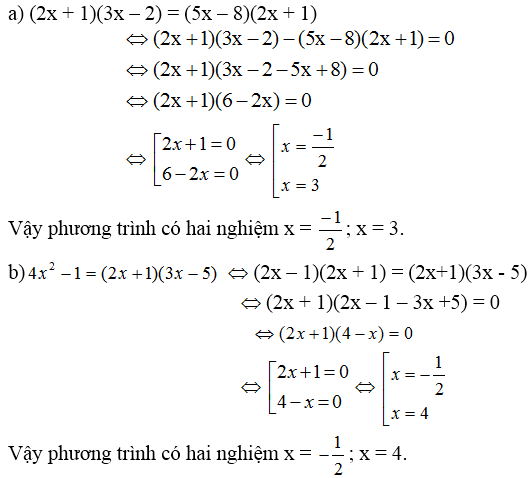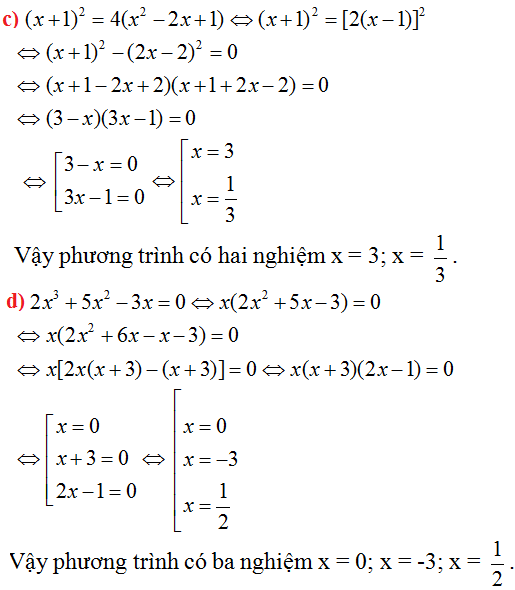Hãy nhập câu hỏi của bạn vào đây, nếu là tài khoản VIP, bạn sẽ được ưu tiên trả lời.

a) \(x^3+x^2+x+1=0\)
\(\Leftrightarrow\left(x+1\right)\left(x^2+1\right)=0\Leftrightarrow x+1=0\)( vì x2+1 khác 0 vs mọi x )
<=> x = -1
Vậy phương trình có tập nghiệm S = { - 1 }
b) \(2x^3+3x^2+6x+5=0\)
\(\Leftrightarrow\left(x+1\right)\left(2x^2+x+5\right)=0\)
\(\Leftrightarrow x+1=0\) ( vì \(2x^2+x+5\ne0\) vs mọi x )
<=> x = -1
Vậy phương trình có tập nghiệm S = { - 1 }
c) \(\left(x+1\right)^2\left(x+2\right)+\left(x+1\right)^2\left(x-2\right)=-24\)
\(\Leftrightarrow\left(x+1\right)^2\left(x+2\right)+\left(x+1\right)^2\left(x-2\right)+24=0\)
\(\Leftrightarrow\left(x+1\right)^2\left(x+2+x-2\right)+24=0\)
\(\Leftrightarrow\left(x+1\right)^22x+24=0\Leftrightarrow2x\left(x^2+2x+1\right)+24=0\)
\(\Leftrightarrow2x^3+4x^2+2x+24=0\)
\(\Leftrightarrow2\left(x+3\right)\left(x^2-x+3\right)=0\)
\(\Leftrightarrow x+3=0\) ( vì \(x^2-x+3\ne0\) với mọi x )
<=> x = -3
Vậy phương trình có tập nghiệm S = { - 3 }
\(x^3^{ }+x^2+x+1\)
\(\Leftrightarrow x^2\left(x+1\right)+\left(x+1\right)\)
\(\Leftrightarrow\left(x+1\right)\left(x^2+1\right)\)

a); b) Do tích = 0
=> Từng thừa số = 0 và ta nhận xét: \(x^2+2;x^2+3>0\)
=> a) \(\orbr{\begin{cases}x=1\\x=-\frac{5}{2}\end{cases}}\)
và câu b) \(\orbr{\begin{cases}x=\frac{1}{2}\\x=5\end{cases}}\)
a; *x-1=0 <=>x=1
*2x+5=0 <=>x=-2,5
*x2+2=0 <=> ko có x
b; tương tự a

chẳng ai giải, thôi mình giải vậy!
a) Đặt \(y=x^2+4x+8\),phương trình có dạng:
\(t^2+3x\cdot t+2x^2=0\)
\(\Leftrightarrow t^2+xt+2xt+2x^2=0\)
\(\Leftrightarrow t\left(t+x\right)+2x\left(t+x\right)=0\)
\(\Leftrightarrow\left(2x+t\right)\left(t+x\right)=0\)
\(\Leftrightarrow\left(2x+x^2+4x+8\right)\left(x^2+4x+8+x\right)=0\)
\(\Leftrightarrow\orbr{\begin{cases}x=-2\\x=-4\end{cases}}\)vậy tập nghiệm của phương trình là:S={-2;-4}
b) nhân 2 vế của phương trình với 12 ta được:
\(\left(6x+7\right)^2\left(6x+8\right)\left(6x+6\right)=72\)
Đặt y=6x+7, ta được:\(y^2\left(y+1\right)\left(y-1\right)=72\)
giải tiếp ra ta sẽ được S={-2/3;-5/3}
c) \(\left(x-2\right)^4+\left(x-6\right)^4=82\)
S={3;5}
d)s={1}
e) S={1;-2;-1/2}
f) phương trình vô nghiệm

a)(2x+1)(3x-2)=(5x-8)(2x+1)
⇔(2x+1)(3x-2)-(5x-8)(2x+1)=0
⇔(2x+1)(3x-2-5x+8)=0
⇔(2x+1)(-2x+6)=0
⇔2x+1=0 hoặc -2x+6=0
1.2x+1=0⇔2x=-1⇔x=-1/2
2.-2x+6=0⇔-2x=-6⇔x=3
phương trình có 2 nghiệm x=-1/2 và x=3

\(a,2x\left(x-3\right)+5\left(x-3\right)=0\)
\(\Leftrightarrow\left(2x+5\right)\left(x-3\right)=0\)
\(\Leftrightarrow\orbr{\begin{cases}2x+5=0\\x-3=0\end{cases}}\Leftrightarrow\orbr{\begin{cases}2x=-5\\x=3\end{cases}}\Leftrightarrow\orbr{\begin{cases}x=-\frac{5}{2}\\x=3\end{cases}}\)
Vậy .........
\(b,\left(x^2-4\right)+\left(x-2\right)\left(3-2x=0\right)\)
\(\Leftrightarrow x^2-4-2x^2+7x-6=0\)
\(\Leftrightarrow-x^2+7x-10=0\)
\(\Leftrightarrow-\left(x-5\right)\left(x-2\right)=0\)
\(\Leftrightarrow\orbr{\begin{cases}x=5\\x=2\end{cases}}\)
Vậy ..................
\(c,x^3-3x^2+3x-1=0\)
\(\Leftrightarrow\left(x-1\right)^3=0\)
\(\Leftrightarrow x=1\)
\(d,x\left(2x-7\right)-4x+14=0\)
\(\Leftrightarrow2x^2-7x-4x+14=0\)
\(\Leftrightarrow2x^2-11x+14=0\)
\(\Leftrightarrow\left(2x-7\right)\left(x-2\right)=0\)
\(\Leftrightarrow\orbr{\begin{cases}x=\frac{7}{2}\\x=2\end{cases}}\)
Vậy ............
\(e,\left(2x-5\right)^2-\left(x+2\right)^2=0\)
\(\Leftrightarrow4x^2-20x+25-x^2-4x-4=0\)
\(\Leftrightarrow3x^2-24x+21=0\)
\(\Leftrightarrow3\left(x-7\right)\left(x-1\right)=0\)
\(\Leftrightarrow\orbr{\begin{cases}x-7=0\\x-1=0\end{cases}}\Leftrightarrow\orbr{\begin{cases}x=7\\x=1\end{cases}}\)
Vậy .....................
\(f,x^2-x-\left(3x-3\right)=0\)
\(\Leftrightarrow x^2-x-3x+3=0\)
\(\Leftrightarrow x^2-4x+3=0\)
\(\Leftrightarrow\left(x-3\right)\left(x-1\right)=0\)
\(\Leftrightarrow\orbr{\begin{cases}x-3=0\\x-1=0\end{cases}}\Leftrightarrow\orbr{\begin{cases}x=3\\x=1\end{cases}}\)
Vậy ..............

a) <=> \(6x^2-5x+3-2x+3x\left(3-2x\right)=0\)
<=> \(6x^2-5x+3-2x+9x-6x^2=0\)
<=> \(2x+3=0\)
<=> \(x=\frac{-3}{2}\)
b) <=> \(10\left(x-4\right)-2\left(3+2x\right)=20x+4\left(1-x\right)\)
<=> \(10x-40-6-4x=20x+4-4x\)
<=> \(6x-46-16x-4=0\)
<=> \(-10x-50=0\)
<=> \(-10\left(x+5\right)=0\)
<=> \(x+5=0\)
<=> \(x=-5\)
c) <=> \(8x+3\left(3x-5\right)=18\left(2x-1\right)-14\)
<=> \(8x+9x-15=36x-18-14\)
<=> \(8x+9x-36x=+15-18-14\)
<=> \(-19x=-14\)
<=> \(x=\frac{14}{19}\)
d) <=>\(2\left(6x+5\right)-10x-3=8x+2\left(2x+1\right)\)
<=> \(12x+10-10x-3=8x+4x+2\)
<=> \(2x-7=12x+2\)
<=> \(2x-12x=7+2\)
<=> \(-10x=9\)
<=> \(x=\frac{-9}{10}\)
e) <=> \(x^2-16-6x+4=\left(x-4\right)^2\)
<=> \(x^2-6x-12-\left(x-4^2\right)=0\)
<=> \(x^2-6x-12-\left(x^2-8x+16\right)=0\)
<=> \(x^2-6x-12-x^2+8x-16=0\)
<=> \(2x-28=0\)
<=> \(2\left(x-14\right)=0\)
<=> x-14=0
<=> x=14

\(\left(x-5\right)\left(x-1\right)=2x\left(x-1\right)\)
\(\Leftrightarrow\left(x-1\right)\left(x-5-2x\right)=0\)
\(\Leftrightarrow\left(x-1\right)\left(x+5\right)=0\)
\(\Leftrightarrow\orbr{\begin{cases}x=1\\x=-5\end{cases}}\)
Vậy............
\(5\left(x+3\right)\left(x-2\right)-3\left(x+5\right)\left(x+2\right)=0\)
\(\Leftrightarrow5\left(x^2+x-6\right)-3\left(x^2+7x+10\right)=0\)
\(\Leftrightarrow2x^2-16x-60=0\)
\(\Leftrightarrow x^2-8x-30=0\)
làm tiếp nhé!!!!!


b.
\(2x^3+3x^2+6x+5=0\\ \Leftrightarrow\left(2x^3+2x^2\right)+\left(x^2+x\right)+\left(5x+5\right)=0\\ \Leftrightarrow2x^2\left(x+1\right)+x\left(x+1\right)+5\left(x+1\right)=0\\ \Leftrightarrow\left(x+1\right)\left(2x^2+x+5\right)=0\\ \Leftrightarrow x+1=0\\ \Leftrightarrow x=-1\)